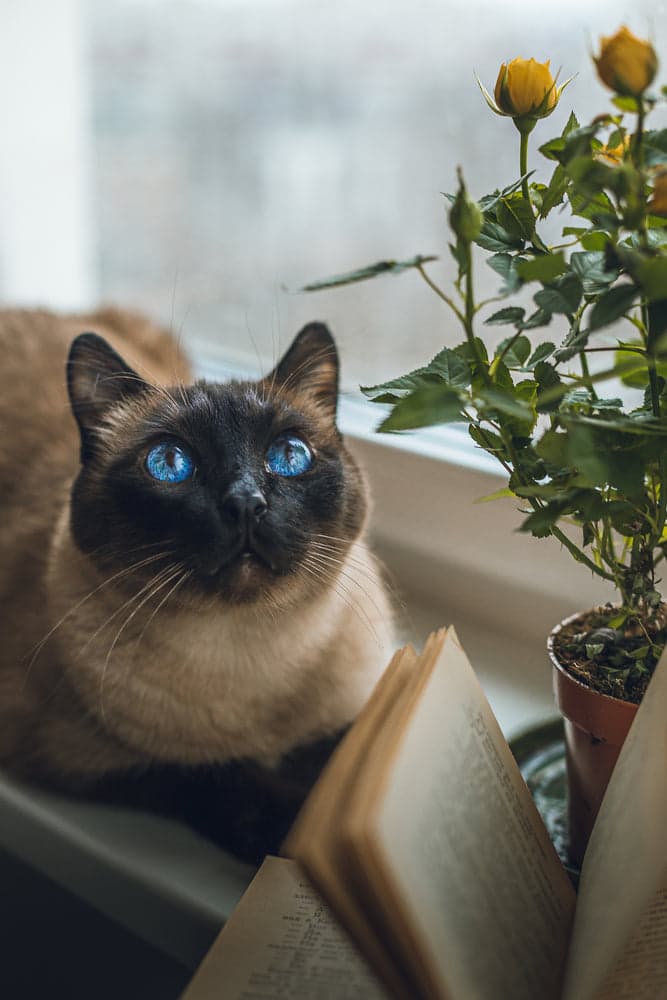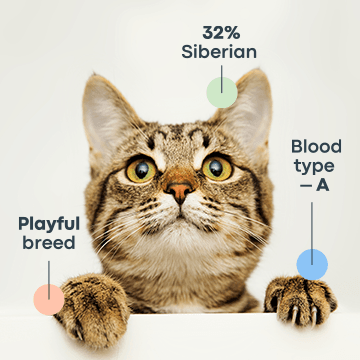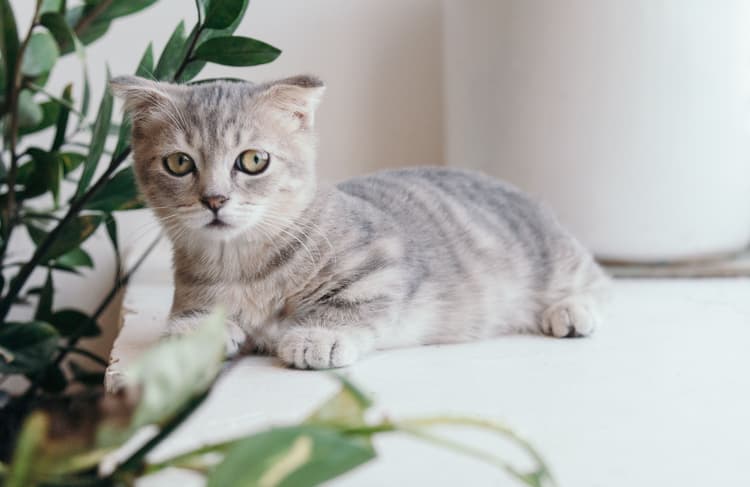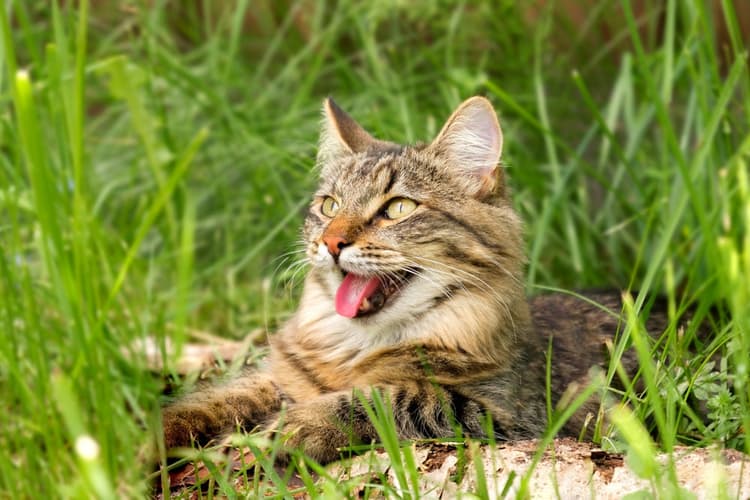Siamese cats are a popular choice of a pet because they are known for being cuddly, fun, and very affectionate. You may have heard of them being labeled “hypoallergenic”, which means that they tend to cause less of an allergic reaction for allergy sufferers. Are Siamese cats truly hypoallergenic? Cat lovers that are allergic to cats will be happy to find the truth revealed in this blog. And if your fondness for cats has been hindered by allergies in the past, read on to find out what simple steps you can follow to reduce the spread of cat-related allergens in your home!
Are Siamese Cats Hypoallergenic?
While there is no cat that is purely hypoallergenic, Siamese cats are considered to be as close as possible. They are suitable for most people who suffer from cat allergies. One reason for this is that Siamese cats shed a lot less than other breeds. Before we dive into a few other reasons, let’s start by debunking the myth of the hypoallergenic cat.
The Myth Of The Hypoallergenic Cat
There is a common misconception that cat hair is directly related to allergies, and that cat allergies are only triggered by cat hair.

However, a person has allergies to cats because of their reaction to certain proteins, predominantly the Fel d 1 protein, which is produced by felines’ sebaceous glands. This means you can find allergens present in a cat’s:
Urine
Saliva
Tears
Mucous
Skin and dander (dead skin cells)
As allergens exist in a cat’s saliva, when a cat grooms itself, by licking, they spread the allergens to their fur. A cat’s dander, like dandruff, also gets caught in a cat’s hair. So, when a person plays or cuddles with their furry friend, the allergens are spread to the person. Also, as your cat moves around the environment they live and play in, they shed hair. This can spread allergens around the house with the hair. Learn more about Fel d 1 and four other feline allergens in our blog titled, Cat Allergy: Are You Allergic to Your Kitty?
Why Are People Allergic To Cats?
Studies suggest that 80% to 95% of people who suffer from cat allergies react to the Fel d 1 protein. A small percentage of people react to the Fel d 2 and Fel d 3 proteins that are also produced by a cat’s sebaceous glands. Technically speaking, since all cats produce these proteins, there are no hypoallergenic cat breeds. This statement is true regardless of their breed, hair length, and the intensity of shedding. Returning to the topic of Siamese cats, they actually produce less of the Fel d 1 protein responsible for triggering allergies in people.
Common Symptoms Of Allergy on Cats
If you have mild cat allergies, spending time with Siamese cats typically won’t trigger any severe reactions.

Common symptoms of an allergic reaction to allergens caused by cats are:
Runny nose
Watery eyes
Sneezing
Throat irritation
Itchy skin
What To Do If You’re Allergic To Cats
It is possible to avoid medication if you take some precautions when it comes to living with a cat. Here are some tips and tricks to consider:

Regular Grooming
Regular grooming is key. It is important to ensure you groom your cat outdoors while wearing gloves and a face mask or perhaps asking someone else to handle the cat while grooming.
Wipe your cat’s fur with a damp cloth to help keep all the remaining dead fur and dander stuck under the cloth.
It is advisable to wash your Siamese cat once a week. The best way to get this right is to start while your cat is a kitten, so they get used to it from a young age.
Regular Cleaning
Wash fabrics around the house often, as well as your clothes after you have interacted with your cat.
You can also cover your furniture with washable covers whenever possible, as these are easier to clean on a regular basis.
Vacuum and dust daily if possible, especially in areas your cat tends to sleep and play.
Create Cat-Free Zones
If you have rooms with doors, you can create cat-free areas around your house that your furry friends can’t access.
It’s probably also best not to let your furry friend sleep in your bed and, if possible, restrict their access to the bedroom.
Other Allergy-Friendly Cat Breeds
Like the Siamese, some cat breeds produce less of the Fel d1 protein than others. A cat’s fur helps spread the allergens around, so the length of your cat’s hair and how often they shed play a role too. Here is a list of cat breeds that may be kinder to allergy sufferers.
Sphynx
The Sphynx is known for its nakedness. Although Sphynx cats still contain the Fel d1 protein in their skin and saliva, they do not have hair to shed around. This reduces the spread of the Fel d1 protein that comes with hair loss around your house.
Balinese-Javanese
The Balinese-Javanese is similar to the Siamese, but with longer hair. Their longer hair helps keep the Fel d1 protein (in the dander) closer to the cat’s skin, rather than spread the protein around, which is preferable for allergy-prone people.
Siberian
Siberians are considered to be very hypoallergenic cats due to the low levels of Fel d1 protein they produce. Their fluffy long hair actually counts in a cat parent’s favor, as it reduces the spread of the allergy-inducing Fel d1 protein.
Devon Rex
Devon Rex cats are inclined to groom themselves less than other cats due to their fine-haired coats. They also tend to shed less. These traits are beneficial for releasing smaller quantities of the Fel d1 protein in the environment they live and play in.
Bengal
Bengal cats, like the Devon Rex, have finer-haired coats, which require less grooming. They also shed infrequently. So, Bengals spread less of the Fel d1 protein around, which makes them more hypoallergenic for cat lovers with allergies.
Ocicat
The Ocicat is also similar to the Siamese. They produce lower levels of dander and Fel d1 protein. These cats also shed little. So, Ocicats make and spread fewer allergens around the house, which is better for those with allergies.
Get To Know Your Cat Better With Basepaws
Basepaws provides pet parents like you with information and resources so that your cats can live their best lives.

A quick and painless swab of your cat’s mouth at home provides you with a world of valuable information about their unique breed mix, genetic predisposition to health conditions, and more. If you want to get to know your cat better—both inside and out—discover our Breed + Health Cat DNA Test and Oral Health Test for Cats, which give you a comprehensive overview of every aspect of your cat's health. Know your cat’s risk for developing common genetic diseases,and learn about how their oral health affects their overall health so that you can be proactive and support your cat’s well-being to help them live a better life, even longer!
Wondering if your cat shares genetic similarities to other hypoallergenic kitties, like the Siamese? Get a Basepaws Cat DNA Test today to find out!
Conclusion
So, it turns out that there is no 100% hypoallergenic cat breed. But there are breeds, like the Siamese, that are less likely to cause allergic reactions than others. They produce smaller amounts of the allergy-inducing feline proteins (particularly the Fel d1). And they shed less, which means they don’t spread the allergens contained in saliva and dander that stick to cat fur around as much. Although there may be a number of hypoallergenic cat breeds for cat lovers with allergies to choose from, a Siamese cat is a good candidate as a hypoallergenic furry friend.
Frequently Asked Questions
Are Siamese Cats Hypoallergenic?
Although there are no 100% hypoallergenic cats, the short answer is: yes. Siamese cats are unofficially classified as hypoallergenic.
How Do I Deal With Allergies To Siamese Cats?
Ensure that you regularly groom your cat outside, clean the environment where they (and you) live and play, and create healthy barriers where your cat cannot enter.
Why Are People Allergic To Siamese Cats?
All cats produce proteins that can cause allergic reactions in people exposed to the allergy-inducing proteins. Siamese produces less of the Fel d 1 protein responsible for irritating people’s allergies. There is a small percentage of people that react to Fel d 2 and Fel d 3 proteins that are also produced by a cat’s sebaceous glands.









